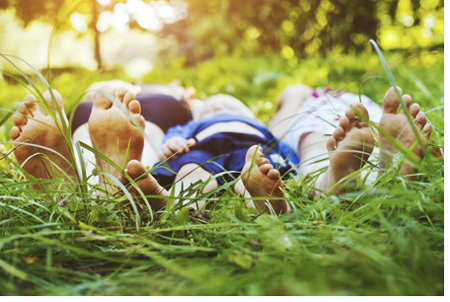Green Space Keeps You From Feeling Blue
Madison, WI; April 11, 2014—If you start feeling better as spring begins pushing up its tender shoots, you might be living proof of a trend discovered in data from the Survey of the Health of Wisconsin: The more green space in the neighborhood, the happier people reported feeling.
(Full story . . . )
Green Space Can Make People Happier for Years
January 8, 2014—Nearly 10 years after the term "nature deficit disorder" entered the nation's vocabulary, research is showing for the first time that green space does appear to improve mental health in a sustained way. The report, which appears in the American Chemical Society (ACS) journal Environmental Science & Technology, gives urban park advocates another argument in support of their cause.
(Full story . . . )
More Fresh Air in Classrooms Means Fewer Absences
June 5, 2013—If you suspect that opening windows to let in fresh air might be good for you, a new study by scientists at Lawrence Berkeley National Laboratory (Berkeley Lab) has confirmed your hunch. Analyzing extensive data on ventilation rates collected from more than 150 classrooms in California over two years, the researchers found that bringing classroom ventilation rates up to the state-mandated standard may reduce student absences due to illness by approximately 3.4 percent.
(Full story . . . )
Outdoor Recess Time Can Reduce the Risk of Nearsightedness in Children
SAN FRANCISCO; May 1, 2013—Two new studies add to the growing evidence that spending time outdoors may help prevent or minimize nearsightedness in children. A study conducted in Taiwan, which is the first to use an educational policy as a public vision health intervention, finds that when children are required to spend recess time outdoors, their risk of nearsightedness is reduced. A separate study in Danish children is the first to show a direct correlation between seasonal fluctuations in daylight, eye growth and the rate of nearsightedness progression. The research was published in the May issue of Ophthalmology, the journal of the American Academy of Ophthalmology.
(Full story . . . )
Outdoor Education Helps Minority Students Close Gap in Environmental Literacy
March 22, 2013—Environmental education programs that took middle school students outdoors to learn helped minority students close a gap in environmental literacy (EL), according to research from North Carolina State University.
The study, published March 22 in PLOS ONE, showed that time outdoors seemed to impact African-American and Hispanic students more than Caucasian students, improving minority students' ecological knowledge and cognitive skills, two measures of environmental literacy. The statewide study also measured environmental attitudes and pro-environmental behavior such as recycling and conserving water.
According to the PLOS One abstract, the study findings suggest that "ethnicity-related disparities in EL levels may be mitigated by time spent in nature, especially among black and Hispanic students."
(Full story . . . )
Admitting Psychology into the Science Club
Cognitive psychologist Brian Kurilla suggests that the field of psychology has evolved to the point that it has earned the right to higher respect within the scientific community.
"Although the field of psychology has made considerable progress over the last few decades in establishing itself as a rigorous, scientific discipline," he points out, "there are some who continue to criticize the field for being 'unscientific.'
These critics point to what they consider ambiguous terminology, a lack of experimental control, and ambiguous subjective measures of constructs like 'happiness' and 'life satisfaction' as reasons why psychology should be considered a 'soft' science at best. However," Kurilla convincingly argues, "these criticisms ignore the diverse methodologies and research areas within the field. There are, in fact, very good reasons to consider a different perspective."
(Full story . . . )
Cheaper than Therapy (And You Get Tomatoes)
More than half of all people in the world now live in cities, say global think tanks, and this trend is not expected to reverse. In fact, by 2050, urban areas may contain as many people as now make up the entire planet’s population.
With this in mind, global non-profits such as the New Cities Foundation hope to find innovative ways to make green spaces more accessible to the burgeoning population of urbanites. But is the occasional oasis of green enough? How important is it for people to have a garden to call their own?
(Full story . . . )
On a Clear Day You Can See Forever
Robert Nathan, who holds a doctorate in chemistry and biology from the California Institute of Technology, has semi-retired from a long and distinguished career as a senior scientist at the Jet Propulsion Laboratory (JPL) in Pasadena, California. In “retirement” he cofounded the Los Angeles Gerontology Research Group and also serves on the board of the Volunteer Professionals for Medical Advancement (VPMA).
In this interview, he talks about some of his research into aging and human longevity. Are we on the brink of immortality?
(Full story . . . )

